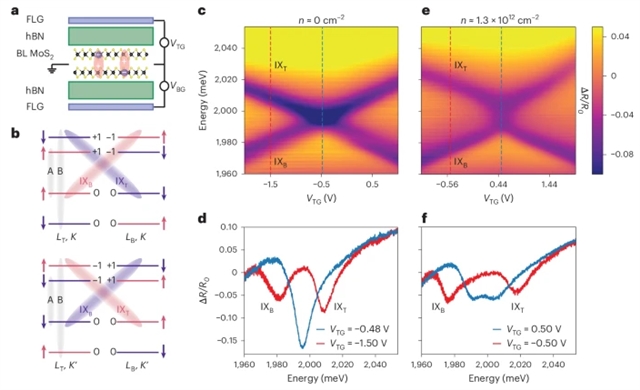
近日,美国哈佛大学Lukin, Mikhail D.团队研究了双层半导体层间电子相干性的光学特征。该项研究成果发表在2025年8月20日出版的《自然—物理学》杂志上。
原子薄的过渡金属二硫族化合物中出现的强相关电子现象是凝聚态物理学中令人兴奋的前沿,从双层超导和电子维格纳晶体到正在进行的激子凝聚的研究都有例子。
研究组向后者迈出了一步,报告了与过渡金属二硫族双分子层中层间电子之间的相干性一致的具有相反偶极子的激子的非常规杂化的实验特征。他们研究了集成在双栅器件结构中的自然生长的MoS2均匀层,该结构允许独立控制电子密度和面外电场。当电子隧穿作用可以忽略不计时,研究团队观察到两个层间激子杂化,表现出不同于传统的水平交叉和反交叉的非对称行为。
研究组证明这些观测结果可以用激子之间的准静态随机耦合来解释,该耦合随电子密度增加而增加,随温度降低。研究团队认为,这种现象表明了层间电子相干性形式的空间波动有序参数,这是一种理论上预测的多体态,但尚未在量子霍尔体系之外的实验中明确建立。
附:英文原文
Title: Optical signatures of interlayer electron coherence in a bilayer semiconductor
Author: Liu, Xiaoling, Leisgang, Nadine, Dolgirev, Pavel E., Zibrov, Alexander A., Sung, Jiho, Wang, Jue, Taniguchi, Takashi, Watanabe, Kenji, Walther, Valentin, Park, Hongkun, Demler, Eugene, Kim, Philip, Lukin, Mikhail D.
Issue&Volume: 2025-08-20
Abstract: Emergent strongly correlated electronic phenomena in atomically thin transition-metal dichalcogenides are an exciting frontier in condensed matter physics, with examples ranging from bilayer superconductivity and electronic Wigner crystals to the ongoing search for exciton condensation. Here we take a step towards the latter by reporting experimental signatures of unconventional hybridization of the excitons with opposing dipoles consistent with coherence between interlayer electrons in a transition-metal dichalcogenide bilayer. We investigate naturally grown MoS2 homobilayers integrated in a dual-gate device structure allowing independent control of the electron density and out-of-plane electric field. By electron doping the bilayer when electron tunnelling between the layers is negligible, we observe that the two interlayer excitons hybridize, displaying unusual behaviour distinct from both conventional level crossing and anti-crossing. We show that these observations can be explained by quasi-static random coupling between the excitons, which increases with electron density and decreases with temperature. We argue that this phenomenon is indicative of a spatially fluctuating order parameter in the form of interlayer electron coherence, a theoretically predicted many-body state that has yet to be unambiguously established experimentally outside of the quantum Hall regime.
DOI: 10.1038/s41567-025-02971-0
Source: https://www.nature.com/articles/s41567-025-02971-0
